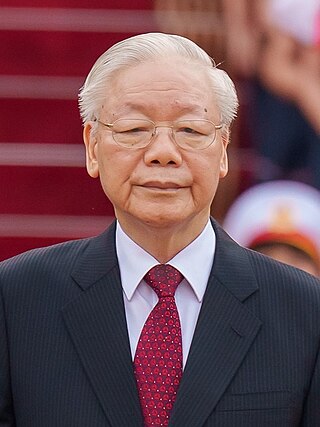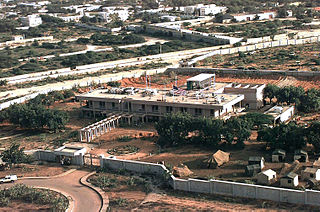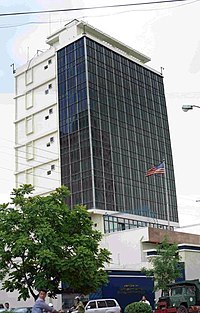
As of June 2024, Vietnam maintains diplomatic relationships with 190 UN member states, State of Palestine and Sahrawi Arab Democratic Republic. In 2011 the Central Committee of the Communist Party of Vietnam, at the 11th National Congress of the Communist Party of Vietnam, released an official statement about Vietnam's foreign policy and a section of the statement stated: "Vietnam is a friend and reliable partner of all countries in the international community, actively taking part in international and regional cooperation processes. Deepen, stabilize and sustain established international relations. Develop relations with countries and territories in the world, as well as international organizations, while showing: respect for each other's independence; sovereignty and territorial integrity; non-interference in each other's international affairs; non-use or threat of force; settlement of disagreements and disputes by means of peaceful negotiations; mutual respect, equality and mutual benefit."

Mongolia has diplomatic relations with all 192 UN states, the Holy See, the State of Palestine and the European Union.

Nguyễn Phú Trọng was a Vietnamese politician and communist theorist who served as general secretary of the Communist Party of Vietnam from 2011 until his death in 2024. As the head of the party's Secretariat, Politburo and Central Military Commission, Trọng was considered Vietnam's paramount leader. From 2018 to 2021, he also served concurrently as president of Vietnam.

The Consulate General of the United States of America, Ho Chi Minh City represents the interests of the United States government in Ho Chi Minh City, Vietnam. The consulate reports to the ambassador at the U.S. Embassy in Hanoi. Prior to the Reunification of Vietnam in 1975, the Consulate General served as the U.S. Embassy Saigon, South Vietnam.

Russia–Vietnam relations date back formally to 30 January 1950, when the Union of Soviet Socialist Republics established an embassy to North Vietnam. The Soviet Union was one of the first countries in the world to recognize and formally establish diplomatic relations with Vietnam, laying the foundations for strong and cooperative friendship between the two countries.

Formal relations between the United States and Vietnam were initiated in the nineteenth century under former American president Andrew Jackson, but relations soured after the United States refused to protect the Kingdom of Vietnam from a French invasion.

Relations between Cyprus and the United States can be described as excellent, both sharing membership in the United Nations, International Monetary Fund, the Organization for Security and Co-operation in Europe, the World Bank and the World Trade Organization. Cyprus has been an observer to the Organization of American States. Cypriots view the United States as their second most trusted ally after France with 62% considering the U.S. a desired ally.

Finland and the United States currently have good relations. The United States recognized Finland on May 7, 1919 after it declared independence in 1917, and officially established diplomatic relations in 1920. Due to World War II and Soviet pressure, relations were suspended between 1942 and 1945 before being raised to embassy level in 1954. Finland has been of strategic importance to the United States due to its position bordering the Soviet Union and later Russia, and after the end of the Cold War in 1991 Finland's shift to the West has led to warmer relations. There is significant trade activity, including military procurement, between the two countries.

Solomon Islands – United States relations are bilateral relations between Solomon Islands and the United States. Initial relations were forged during World War II with what was then the British Solomon Islands Protectorate during the Japanese occupation, and this relationship remained strong as Solomon Islands gained its independence in 1978. Relations continued until 1993 when post-Cold War budget cuts closed the United States Embassy in Honiara. Beginning in 2022, in an attempt to counter growing Chinese influence in Solomon Islands, the United States has demonstrated increased commitment to the restoration of relations with the country. In February 2023, the United States re-opened its embassy in Honiara.

Somalia–United States relations are bilateral relations between the Federal Republic of Somalia and the United States of America. Somalia has an embassy in Washington, D.C., and the United States maintains an embassy in Mogadishu which was reopened in late 2019.

India–Vietnam relations, also known as Indian-Vietnamese relations, are the bilateral relations of India and Vietnam.

Foreign relations exist between Australia and Vietnam. Australia has an embassy in Hanoi and a consulate in Ho Chi Minh City. Vietnam has an embassy in Canberra.

Indonesia and Vietnam established diplomatic relations in 1955. Indonesia has an embassy in Hanoi and a consulate general in Ho Chi Minh City while Vietnam has an embassy in Jakarta. Both are neighboring nations that have a maritime border which lies on the South China Sea and are members of ASEAN and APEC.

The Consulate General of United States, Guangzhou is one of seven American diplomatic and consular posts in China. It is one of America's earliest diplomatic posts in the Far East. The consulate serves the South China region, covering the provinces of Guangdong, Hainan and Fujian, and the Guangxi Zhuang Autonomous Region, an area which, according to the latest census in 2020, has a resident population of over 220 million. The consulate general is also the only U.S. mission in mainland China to process American adoptions and immigrant visas, making it one of the U.S. Department of State’s busiest consular-related posts.

The Embassy of the United States of America to Somalia is a diplomatic mission of the United States in Mogadishu, Somalia from 1960 to 1991. In 1957, the US opened a consulate-general in Mogadishu—the capital of the Trust Territory of Somalia, a UN trusteeship under Italian administration. The consulate was upgraded to embassy status in July 1960, when the US recognized Somalia's independence and appointed an ambassador. The embassy served to counter Soviet influence during the Cold War and also served as a base for the United States Agency for International Development, which had a large presence in the country. In 1989, the embassy moved from a dilapidated building in central Mogadishu to a new compound on the outskirts of the city.

The nations of Mexico and Vietnam established diplomatic relations in 1975. Both nations are members of the Asia-Pacific Economic Cooperation, Forum of East Asia-Latin America Cooperation and the United Nations.

Canada and Vietnam have maintained bilateral relations since 1973. Both nations are members of the Asia-Pacific Economic Cooperation, Organisation internationale de la Francophonie and the United Nations.



















